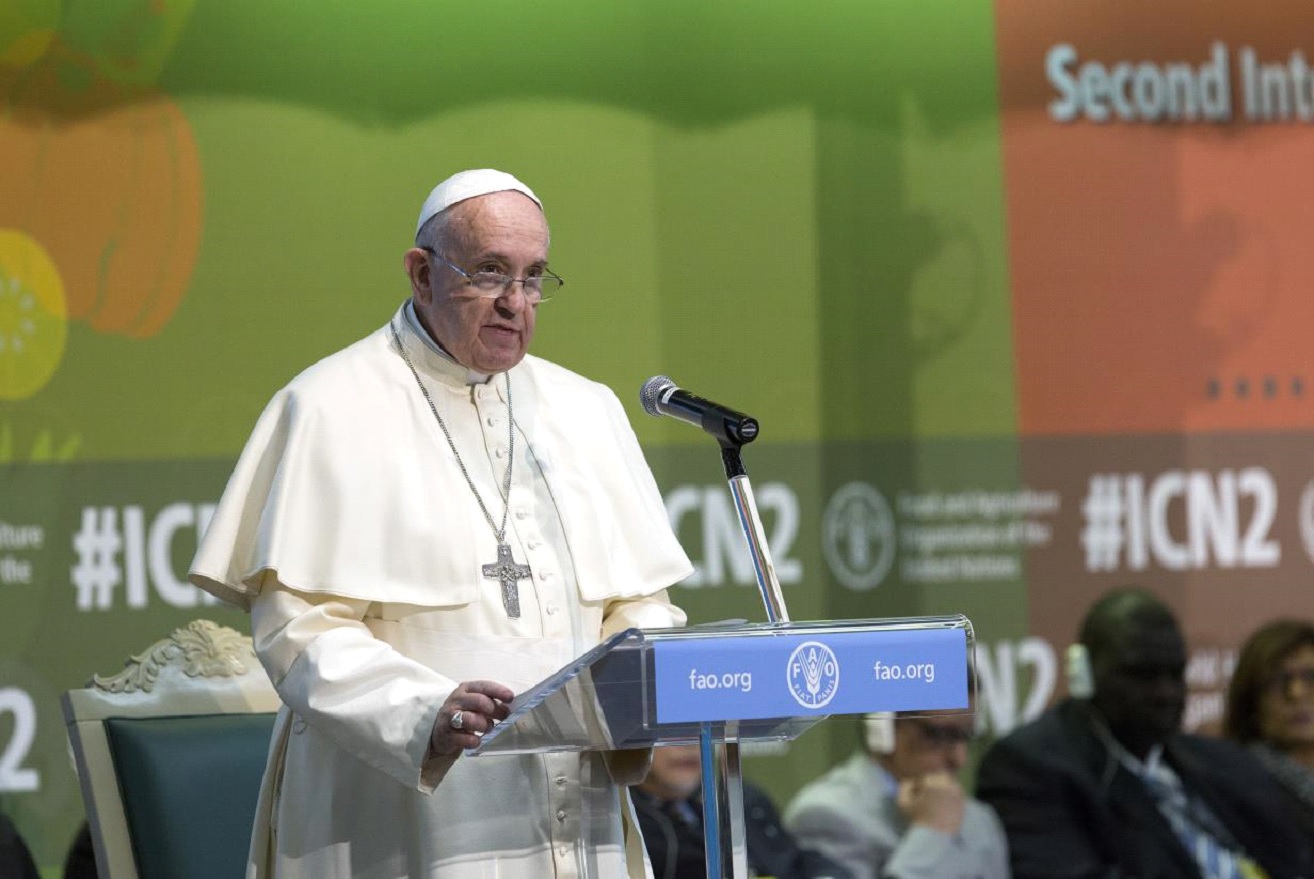Opinions
Pope Francis—A Moral Beacon for a Hungry World

Pope Francis speaking at FAO in 2014
©FAO/Alessandra Benedetti
“The future of humanity is written in the fields, villages, and forests where the excluded fight for dignity.” These words, spoken by Pope Francis in 2017, have long echoed across the arid landscapes and conflict-scarred communities of the Near East and North Africa. Today, as the FAO’s NENA office joins the global remembrance of His Holiness, we reflect not merely on his passing but on the indelible moral framework he gifted to our shared fight against hunger and inequality.
Pope Francis, who left us on April 21, 2025, was more than a spiritual leader; he was a relentless advocate for the disenfranchised. His papacy transcended religion, challenging institutions and individuals alike to confront what he termed the “globalization of indifference.” For those of us working in regions like NENA—where climate shocks, protracted conflicts, and economic fragility compound food insecurity—his teachings were a compass.
A Vision Aligned With the Struggles of the Marginalized
The Pope’s encyclical Laudato Si’ (2015) was not just a theological document but a manifesto for our times. By framing environmental degradation as a moral crisis, he gave voice to farmers in Sudan’s drought-stricken villages and herders in Iraq’s vanishing marshlands. His insistence that “hunger is a crime in a world of plenty” resonated deeply here, where 55 million people face acute food insecurity despite abundant resources hoarded by the few.
His advocacy for the Sustainable Development Goals (SDGs) was never abstract. When he condemned the “economy of exclusion,” we saw the faces of Yemeni mothers bartering jewelry for sacks of wheat. When he called food waste a “scandal,” we recalled the tons of produce rotting in Lebanon’s ports while Syrian refugees scavenged for scraps. His alignment with SDG 2 (Zero Hunger) and SDG 13 (Climate Action) was not theoretical—it was a rebuke to systems that prioritize profit over people.
A Partner in the Trenches
The Pope’s collaboration with FAO was transformative for NENA. His 2015 address linking industrial agriculture to hunger catalyzed projects like climate-smart oasis farming in Tunisia and drought-resistant barley trials in Morocco. He championed smallholder farmers, who form the backbone of our region’s food systems, calling them “the heartbeat of food security.” This ethos underpins FAO’s Hand-in-Hand Initiative here, which empowers rural women in Egypt and Jordan to reclaim agency over land and resources.
During the Sahel crises and Ukraine war, his warnings that “war breeds hunger, and hunger breeds chaos” struck a chord. In Syria, where 12 million remain food insecure after 14 years of conflict, his push for humanitarian access saved lives. Even in his final years, his endorsement of FAO’s Global Roadmap to End Hunger (2024) galvanized our work with displaced communities in Libya and Sudan.
The Unfinished Revolution
Yet, Pope Francis’s legacy is not a eulogy but a rallying cry. As FAO’s NENA team mourns, we also recommit. The challenges he highlighted—corporate land grabs in Iraq, water scarcity in Somalia, youth disillusionment in Algeria—persist. His call for a “revolution of tenderness” demands that we confront these issues not with technocratic fixes but with radical empathy.
To honor him, we must:
- Elevate agroecology beyond pilot projects, scaling practices like Egypt’s solar-powered irrigation or Mauritania’s desert reforestation.
- Dismantle systemic waste, whether in Lebanon’s broken supply chains or the Gulf’s excess-centric food culture.
- Amplify marginalized voices, ensuring that Bedouin herders and Kurdish farmers shape policies affecting their futures.
In his 2020 UN address, Pope Francis reminded us: “We cannot claim to care for the Earth if we ignore the cry of its poorest inhabitants.” For NENA, a region where the cries of the poor intertwine with the echoes of ancient civilizations, his words are both indictment and inspiration.
As I write from Cairo, where the Nile’s waters sustain life yet remain a source of strife, I am reminded that the Pope’s legacy lives not in Vatican archives but in the soil tilled by a Fellahi farmer in Upper Egypt, in the resilience of a Gaza family tending a rooftop garden, and in our collective choice to “replace indifference with courage.”
The path ahead is arduous, but as His Holiness taught us: “Sustainability is not a technical challenge but a test of our humanity.” Let us meet that test.
5577b63893dd43d6bde57a1df7fc2889.jpeg?sfvrsn=63cbecc6_6)
By: Mohamed Alaidaroos Alhashimi
Regional Communication Officer for FAO’s Near East and North Africa office, based in Cairo.
The views expressed are his own
